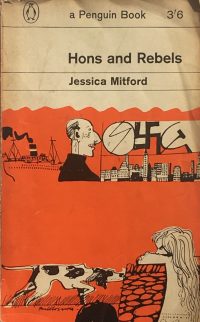Invisible boundaries kept me boxed in from the real life of other people going on all around
 Hons and Rebels
Hons and Rebels
by Jessica Mitford
I am not the first person to be fascinated by the Mitfords. For a few years now, I have felt that I need to read something by Jessica to better understand the family. She was the outlier, the one who left. And y’know, not a Nazi.
This is Jessica, or Decca’s, memoir of the first portion of her life. She recounts her childhood, her political awakening and her relationship with Esmond Romilly. I laughed, I cried, I shook my head often in disbelief.
As she admits, her childhood was unconventional. They were old-fashioned upper-class toffs, distantly related to royalty and less distantly to Winston Churchill. Jessica and her five sisters received no formal education (though their brother was sent away to school). They instead enjoyed a series of private tutors whom they teased and tortured. This meant they reached adulthood in a state that was both worldly and hugely naive and sheltered. Perhaps this explains the extreme political allegiances of at least three Mitford sisters.
“Invisible boundaries kept me boxed in from the real life of other people going on all around – there were rules against talking to strangers, against seeing a film unless Muv had seen and approved it first…there was the company of my own family exclusively; there was, above all, the crushing realization of my own limitations.”
Jessica acknowledges early on that readers may recognise some of the events she covers from her sister Nancy’s thinly veiled autobiographical novel The Pursuit of Love. She deals with this in what could be a humorous offhand comment, or could be a savage swipe, depending on how you read it. As someone who has indeed read The Pursuit of Love and The Mitford Girls, I did know the bare bones of Jessica’s story, but that’s no replacement for hearing it in her own words, with the details she feels to be important.
Her words are, unavoidably, those of someone born into tremendous privilege. The “jolly hockey sticks” tone oozes from the earlier pages. It is almost comedic the number of false starts that Jessica has in breaking away from her family’s right-wing politics to pursue her own left-wing ideals. Adult Jessica is certainly a socialist, and that choice cuts her off from the bulk of her family’s money, but she still has plenty of rich family and friends to visit.
Jessica’s early life coincided with extreme political events, and she mixed in circles where these were not distant but part of her daily life. Oswald Moseley and Adolf Hitler were among her family’s close acquaintances, while her cousin Romilly made newspaper headlines when he ran away to Spain to fight against Franco in the civil war. Jessica credits Romilly’s letters to his uncle Churchill with having directly affected British foreign policy, though this may be a rose-tinted view of her first love rather than historical fact.
I wouldn’t say this book makes light of terrifying political reality, but Jessica can be shockingly blasé about certain matters. I do like that she shows enough self-awareness to gently mock her own failed attempt to join the Spanish Civil War. And the way she describes living through the Second World War felt eerily relatable as I read this in the early days of the COVID-19 lockdown (no, I don’t think it’s the same at all, except in the sense that we know we are living through something historically significant).
“Usually the events which make history seem to take an interminable time when one is living through them. Only years later do the essentials appear in perspective, telescoped and summarized in glib phrases for the history books…In real life, the maturing of the crisis that leads up to a change in government, the course of international negotiations and conferences that shape the destiny of a generation, the ebb and flow of battles that decide the outcome of a war, unroll in maddeningly slow-motion fashion, the decisive meaning of each stage often obscured and buried under mountains of newsprint…Not so the German offensive against Western Europe, when it was finally unleashed.”
This is not the attack on the other Mitfords that I had for some reason expected, but rather an amusing and thoughtful exploration of how Jessica came to be who she was. And an excellent random street market find.
First published 1960 by Gollancz.
Challenges: This counts towards the Classics Club challenge.
Source: A bric-a-brac stall at St Nicholas street market in Bristol, back when we could go to such places.